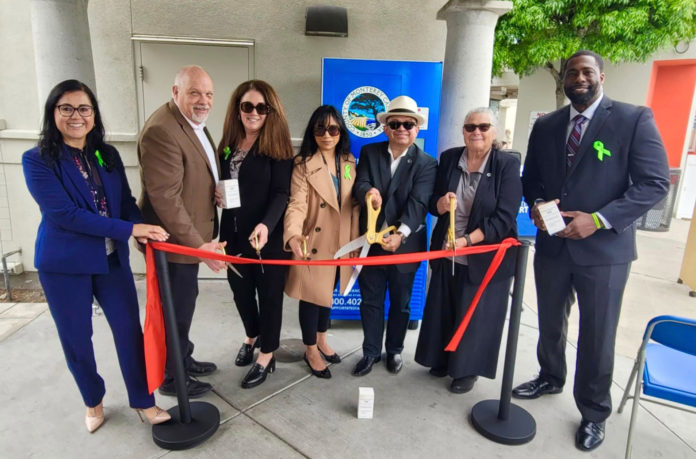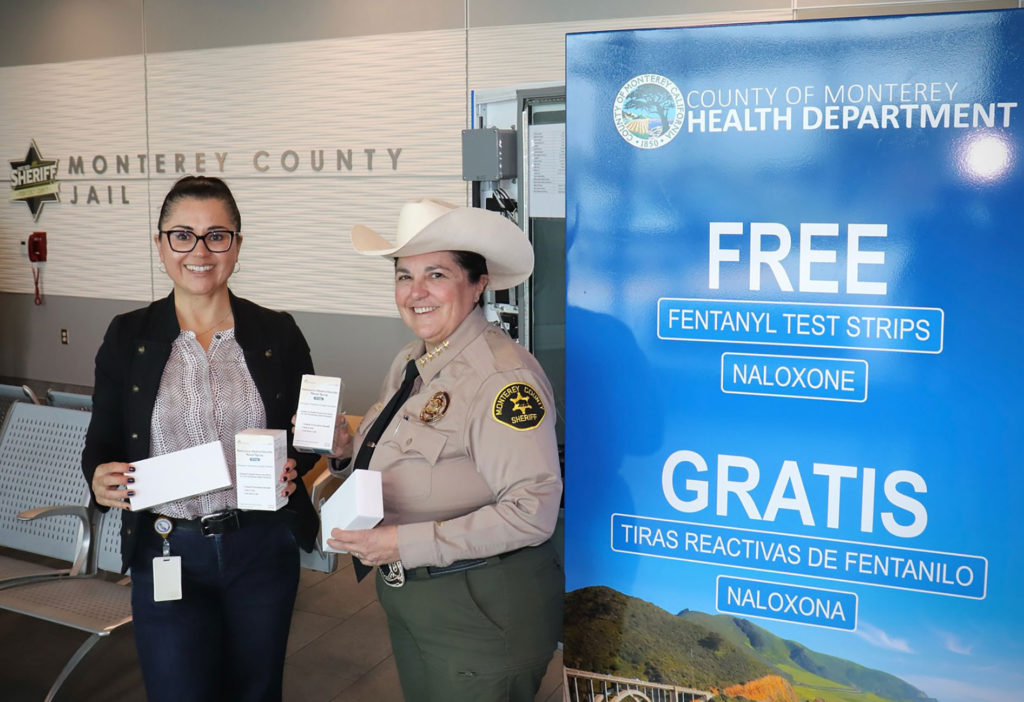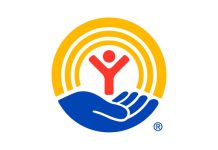
MONTEREY COUNTY — In a significant move to combat the opioid crisis and prioritize public health, the County of Monterey Health Department has unveiled a pioneering initiative providing free, around-the-clock access to naloxone and fentanyl test strips through strategically placed public vending machines across the county.
The initiative, celebrated with a ribbon-cutting ceremony last Thursday afternoon at the MST Salinas Transit Center, marked the activation of one of four new vending machine locations. Coinciding with the recognition of Mental Health Month and National Fentanyl Awareness Day, the May 1 event highlighted the county’s commitment to equipping communities with vital tools to prevent overdose deaths.
Each user-friendly vending machine is stocked with 250 units of both naloxone and fentanyl test strips and features a touchscreen interface for easy selection. Step-by-step instructions are provided in both English and Spanish, aiming to empower anyone to respond effectively in an emergency.
The four locations where the vending machines were installed are:
- New Behavioral Health Access Outpatient Clinic, 30 Pearl St., Salinas;
- MST Salinas, 110 Salinas St., Salinas;
- MST Marina, 280 Reservation Road, Marina; and
- Monterey County Jail, 1410 Natividad Road, Salinas.
Naloxone, commonly known by the brand name Narcan, is a safe and effective medication capable of reversing an opioid overdose within minutes. Data from the Centers for Control and Prevention (CDC) indicates that over 100,000 people die from drug overdoses annually in the United States, with opioids implicated in nearly 75% of these fatalities. However, studies have shown that widespread naloxone distribution can significantly reduce overdose deaths, with reductions of up to 21% observed in communities with active programs.

By enhancing access to naloxone through these public vending machines, Monterey County is taking a proactive step to increase the likelihood of individuals surviving an overdose and connecting with necessary care and support.
“This effort reflects our commitment to saving lives and creating safer communities,” stated Elsa Jimenez, Director of Health Services at the County of Monterey Health Department. “By making overdose reversal tools available around the clock, we hope to support those in need and reduce preventable deaths.”
Monterey County Sheriff Tina Nieto also emphasized the critical need for this initiative and the importance of preventing addiction among young people.
“The most tragic losses are our kids,” Nieto remarked. “We are hoping this saves lives [as …] opioids kill thousands of people every year in the United States. We are still in crises when it comes to these kinds of drugs. It’s the opioid crisis. The addiction of that drug has led to the fentanyl crisis … so our children, our neighbors, our friends are getting counterfeit stuff. One pill can kill. Parents, please pay attention. For the community out there, please take advantage of this free kiosk where you can either get the test strips or can carry the Narcan … It affects every community.”
Carl Sedoryk, MST General Manager/CEO, echoed this sentiment, saying, “Partnering with the County of Monterey to make life-saving medication like Narcan available at transit locations is a critical step in protecting our community. The Narcan kiosk at the Salinas Transit Center ensures 24/7 access to overdose reversal medication and fentanyl test strips, empowering individuals to respond in emergencies, reducing opioid-related deaths and strengthening our collective safety net. This is about saving lives, increasing awareness and providing critical resources where they are needed most.”
This initiative is part of the County of Monterey’s broader public health strategy, funded in part by opioid settlement funds, to mitigate the devastating impact of opioid use and establish pathways to treatment and recovery.
In collaboration with Decoded, a statewide youth substance use education movement, the County is also developing a youth-focused communications campaign aimed at preventing opioid misuse before it starts and offering support to young people already struggling with substance use.














